Many dog owners are nervous about using commercially manufactured floor cleaners in their home. They worry that the chemicals used in these products may make their dog sick or irritate their pet’s skin.
Ironically, the very act of owning a dog means that you’ll likely need to clean your floor more than the average person. After all, dogs track dirt into your home, slobber on the floor, and make messes while they’re eating and drinking.
But don’t fret: We’ll try to help you navigate these challenges below.
We’ll point out some of the potentially dangerous floor-cleaning products you may want to avoid, explain some general floor-cleaning tips to help keep your pet safe, and provide several safer alternatives that you may feel more comfortable using.
Quick Picks: Best Pet-Safe Floor Cleaners
First Thing’s First: Are Ordinary Floor Cleaners Dangerous to Dogs?
Many pet owners assume that floor cleaners are dangerous for dogs, and there’s no shortage of animal-related websites that stoke these fears. It’s easy to come away from such sites thinking that the jug of Pine Sol or the Swiffer sitting in your pantry is going to kill your pet in excruciating fashion.
But the truth is far less dramatic.
Yes – some of the chemicals used in commercially manufactured floor cleaners can represent a danger to your pet.
If your dog laps up a cup’s worth of spilled bleach or ammonia, he’s definitely going to get very sick. He could also suffer from serious skin irritation if he lays in a puddle of these substances, or experience lung damage if he starts huffing them straight from the bottle.
We will talk about some of the chemicals commonly used in these products in a moment and explain the nature of the dangers they represent. However, the majority of floor-cleaning products are safe to use around dogs.
You don’t have to take my word for it – just check out what Veterinarian Tina Wismer, medical director at the ASPCA’s animal poison control center, had to say in an interview with Cesar’s Way:
Commercial over-the-counter cleaners, when used as directed on the label’s instructions, are safe to use around your four-legged family member.
The bolding is mine. I did so because that’s the entire crux of the issue – you have to use these products safely and as directed by the manufacturer.
Dr. Wismer goes on to say that the residuals left behind by these products are typically minimal. She also points out that you can simply rinse your floors with plain water afterward if you are worried.
Chances are, your dog has been and will continue to be exposed to these types of commercial floor cleaners many times over the course of his life. For example:
- You never know what stores, airports or other commercial establishments are using to clean their floors, yet you probably don’t think twice about bringing your dog into these places.
- Vet clinics and shelters occasionally need to use bleach to clean their floors after treating dogs with some illnesses.
- Your friends and family members probably don’t use pet-friendly floor cleaning products, yet you still let your pup tag along for visits.
- Some pet stores will use bleach or ammonia-containing products to clean their floors, yet dogs walk into and out of these places all the time without falling ill.
But I get it – I love my pooch more than anything too. I wouldn’t want her to get sick, and I can understand wanting to err on the side of caution, by using floor cleaners that are specifically designed to be safe around pets.
It’s also worth considering the long-term effects typical floor cleaners may have on our pets. There’s nothing wrong with this mindset and we’ll talk about pet-friendly cleaners in a minute.
Five Reasons Pet Owners Need to Use Care When Cleaning Their Floors
While most commercial floor cleaners are safe for dog owners to use (provided that you do so in a safe and prudent manner), some of them can cause illness or injury if used carelessly. Some may even represent a bigger threat to your pet than they do to the two-legged members of your family.
There are five primary reasons that this is true:
- A dog’s paws, coat, and skin are in frequent contact with the floors in your home. Your dog not only walks around your home barefoot, he probably lays on the floor quite a bit too (even if you provide him with a bed). This type of direct contact can lead to skin irritation and rashes.
- Dogs breathe and sniff in close proximity to your floor. You may think the fumes and odors caused by floor cleaners are strong, but they’re even stronger close to the floor, where our dogs spend their lives. Even if you have a 200-pound Great Dane, his head is often going to be close to the floor quite a bit, where he’ll end up breathing in the fumes emanating from the floor.
- Dogs lick floors frequently. If you’ve had your dog longer than 15 minutes, you’ve undoubtedly noticed that dogs lick floors all the time. The reasons they do so are varied; in some cases, they lick floors because of tasty residues they find, in other cases, they’re likely just curious. But no matter the reason they do so, it clearly exposes them to the chemicals you use to clean your floors.
- Most dogs are smaller than people. As toxicologists are often fond of saying: The dose makes the poison. Plenty of chemicals are safe in small quantities, but dangerous in large quantities. So, because the average dog is smaller than the average person, dogs often become sick when exposed to much less of a given toxin that it would take to sicken a human. This also implies that small dogs are usually more vulnerable to floor-cleaning chemicals than large dogs are.
- Dogs and humans have significant biological differences. File this under utterly obvious facts that needn’t be said, but it is an important factor to keep in mind. Canines are simply more sensitive to some chemicals than humans are.
Potentially Toxic Cleaning Ingredients
The first thing you’ll need to do when searching for a pet-safe floor cleaner is to familiarize yourself with some of the most notable ingredients they contain. Remember, most of these are still safe to use around dogs, but it is important to understand which chemicals may cause problems.
These include the following:
Bleach
Bleach – technically called sodium hypochlorite – is a very common household cleaner that makes an effective disinfectant when used properly.
Most household bleach products are fairly dilute (they typically contain only 3% to 8% sodium hypochlorite), but they can still cause pretty significant skin irritation and they can also burn the eyes, mouth, or nose. Bleach fumes can also irritate the nose, throat, eyes, and lungs. In fact, it’s recently been determined that long-term bleach exposure can lead to asthma in humans.
Given the potential dangers it represents, you’ll want to be sure to use bleach carefully around dogs.
Ammonia
Ammonia is a naturally occurring substance, which is caustic and very dangerous in concentrated form. If you happen to get some concentrated ammonia on your skin, it’s going to cause a very serious wound. Ammonia fumes can also cause severe damage to your nose, throat, and lungs.
Nevertheless, most household products containing ammonia are highly diluted (typically in the 5% to 10% range). So, while you still don’t want to touch this stuff or let it contact your pet’s skin, it isn’t as dangerous as concentrated versions. Additionally, ammonia fumes, being lighter than air, tend to disperse pretty readily.
Phenols
Phenols are volatile chemicals that appear in most cleaning products that contain the suffix -sol. Phenols are used for a variety of purposes, ranging from floor cleaners to tissue preservation to DNA analysis.
But while phenols aren’t very dangerous when diluted, concentrated phenols are very hazardous. They are corrosive, so they can damage skin and mucous membranes, and they’re also toxic if ingested. At least one person has died from ingesting about a tablespoon’s worth of concentrated phenol.
Accordingly, it is very important to be cautious when using floor cleaners with phenols. Always make sure your floors dry completely before allowing your pet to walk on them and be sure to ventilate the area very thoroughly.
Glycol Ethers
Glycol ethers are used in an incredible array of consumer products, ranging from floor cleaners to cosmetics. In highly diluted form, many glycol ethers are safe, but direct contact with concentrated forms can cause injury or illness.
Acute exposure to glycol ethers can cause liver or kidney damage, and it can also cause fluid to accumulate in the lungs. Glycol ethers are dangerous to ingest or inhale in significant quantities.
Phthalates
Phthalates are used in a variety of plastic consumer goods as well as cleaning products. However, most manufacturers have begun trying to replace phthalates with other, safer compounds over the last few years, as scientists and researchers have started documenting the health problems they may cause.
Among other things, phthalate exposure is thought to disrupt the function of the endocrine system. And while this may not be as acutely troubling as things like chemical burns or liver damage, it is probably something you’ll want to protect your pet from.
Fortunately, fewer and fewer products are made with phthalates each year; it won’t be very long before they’re replaced entirely.
What Makes a Cleaner Safe for Pets?
Again, most commercial floor cleaners are safe for your pets, provided that you use them in accordance with the manufacturer’s instructions. However, that doesn’t mean some cleaners aren’t safer than others.
The safest cleaners usually don’t include any of the troubling ingredients listed above (glycol ethers, phthalates, phenols, ammonia or bleach).
Additionally, the best floor cleaners don’t produce strong fumes or leave residues on floors. They should also dry quickly and have a relatively brief ingredient list.
However, it is important to note that cleaners that meet these criteria are usually not going to disinfect floors. They’ll remove dirt and grime, but they usually won’t kill the bulk of the bacteria living on your floors.
Accordingly, you may still need to use a diluted bleach or ammonia solution on your floors from time to time.
Dog Safe Floor Cleaning FAQs
A lot of people have questions about dog safe floor-cleaning products, and pet owners often have even more questions. We’ve tried to answer a few of the most common floor cleaning questions dog owners have below.
Are Swiffer floor-cleaning products safe to use around pets?
Yes. Despite the rumors swirling around the internet, Swiffer products are safe to use around pets.
Is Pine Sol safe to use around pets?
Yes. Pine Sol products are safe to use around pets. As an aside, I’ve personally used Pine Sol products to clean the floors of an animal care facility that was home to dozens of animals, including cats and dogs.
Is Simple Green safe to use around pets?
A lot of dog owners have used Simple Green cleaning products for years, and it appears to be safe. However, the company does not list the ingredients used in the product, which is pretty troubling. Additionally, the Environmental Working Group explains that it contains substances that may be human carcinogens.
How long do you need to keep your pet off recently cleaned floors?
No matter what type of floor-cleaning product you use, it’s a good idea to keep your pets out of the area until the floor is completely dry, and the bulk of the fumes have dispersed.
Just take the opportunity to open a few windows and let some fresh air in your home. Turn on any ceiling fans you have to help accelerate the process.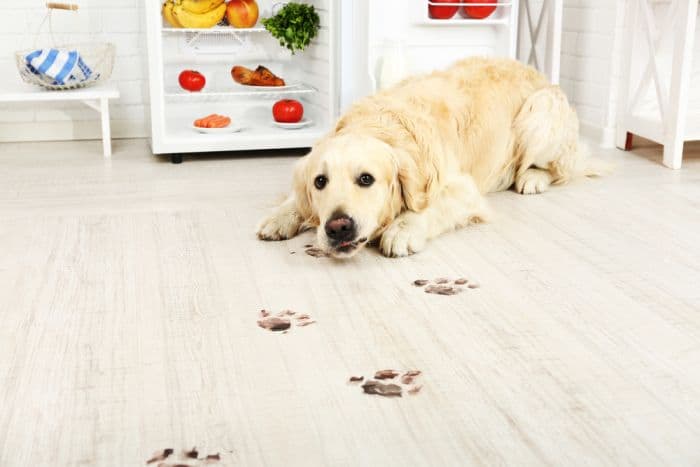
Best Pet-Safe Floor Cleaners
The following four products should help you keep your floors clean without making your pet sick. Just be sure to follow the manufacturer’s instructions carefully when using any cleaning product.
1. Better Life Floor Cleaner
Better Life Floor Cleaner is a plant-based product that can be used on most floors.
- DIRT DESTROYING CLEAN - Freshen up your floors from messes, toothpaste, pet drool, smudges, foot...
- WORKS ON - An all-purpose mopping solution that works on hardwood, tile, marble, laminate, vinyl,...
- WORRY-FREE MOPPING - Our all-purpose floor cleaning solution is made with no petroleum solvents,...
- EARTH FRIENDLY PRODUCTS - Give a better life to the next generation and avoid the use of harsh...
Features: Better Life Floor Cleaner can be used on most floors, including those made from hardwood, ceramic tile, stone, bamboo, vinyl, or laminates. The product was developed without the use of animal testing, and it has a pleasant, citrus and mint fragrance.
According to the manufacturer, you can simply squirt this product right on the floor, and it will not leave any residues, nor require any rinsing.
Ingredients: Purified water, blend of natural coconut- and corn-based surfactants, vegetable glycerin, pure essential oils of spearmint, grapefruit and bergamot, preservative.
PROS: Most customers who tried Better Life Floor Cleaner were very happy with the product. Most reported that it cleaned floors very well and that it has a very pleasant fragrance. It appears to work on most types of floors, and several customers were pleased with how long a single bottle lasted.
CONS: A few customers mentioned that it left a sticky residue on your floors, while a few others were disappointed that it seemed to make floors appear hazy after use.
2. Puracy Natural All Purpose Cleaner
Puracy Natural All-Purpose Cleaner is a concentrated cleaning product that was recognized as “The Best All-Purpose Cleaner” by the New York Times.
- "The Best All-Purpose Cleaner" - The New York Times
- SAVE 58% VS. FULL-SIZE BOTTLES: Makes 1 gallon of cleaner; 90% reduction in plastic packaging
- SUPERIOR RESULTS: Guaranteed to safely clean any hard surface without streaking
- CREATED BY DOCTORS: Developed & Tested by PhDs, the plant-based formula effectively removes food,...
Features: Puracy Natural All-Purpose Cleaner was developed by doctors and PhDs to ensure that it is not only safe but effective too. It works well on most types of messes, including pet accidents, grease, dirt, and even tree sap. This product is designed to be diluted with water before use.
Puracy is a plant-based cleaner, which has not been tested on animals and is made in the USA.
Ingredients: Purified Water, Decyl Glucoside (Vegetable-Based Cleanser), C10-C16Alcohol Ethoxylate (Plant-Based Cleanser), Tetrasodium Glutamate Diacetate (Plant-Based Cleanser), Benzisothiazolinone (Biodegradable Preservative), Sodium Citrate (Plant-Based pH Neutralizer), Natural Fragrance, Citric Acid (Plant-Based pH Neutralizer)
PROS: By and large, Puracy Natural All-Purpose Cleaner received very positive reviews from customers who tried it. It appears to work well in a variety of applications, so in addition to cleaning your floors, you can use it to clean counters and other surfaces. Several owners even reported using this as a hand soap.
CONS: A few customers who tried this product complained that it left streaks on most surfaces. Additionally, while some customers didn’t seem to mind the product’s scent, others characterized it as “offensive” and “overpowering.”
3. Eco-Me Natural Multi-Surface Floor Cleaner
Eco-Me Natural Multi-Surface Floor Cleaner is a plant-based, concentrated cleaning product which you can use on most non-porous surfaces in your home.
No products found.
Features: Eco-Me Floor Cleaner is designed to be diluted (1/4 cup to 1 gallon of water) for routine cleaning, but it can also be used at full strength to clean exceptionally dirty areas. This product not only cleans floors, but it also helps improve their shine and protects them as well.
This product was developed without being tested on animals, and, according to the manufacturer, has natural antibacterial properties.
Ingredients: Water, Coco Glucoside (Plant-derived soap), Decyl Glucoside (Plant-derived Soap), Capryl Capryl Glucoside (Plant-derived Solubilizer), Leuconostoc (Radish Root Antimicrobial), Xanthan Gum, Natural Plant Essential Oils, Glyceryl Caprylate Caprate (Vegetable-derived Thickener), Potassium Sorbate (Food-grade Preservative)
PROS: Most customers who tried Eco-Me Natural Floor Cleaner were very pleased with their purchase. It appears to work well on most surfaces, and a few customers even reported that it worked better than traditional cleaners did. Most people appeared to find the product’s scent pleasant.
CONS: There weren’t many complaints about Eco-Me Natural Floor Cleaner, but a few customers were disappointed in its ability to clean dirty surfaces. Additionally, some customers found that it created more suds than they would have preferred.
4. Aunt Fannies Vinegar Floor Cleaner
Aunt Fannies Vinegar Floor Cleaner is a very simple floor-cleaning product, primarily composed of white vinegar and other plant-based extracts.
- Aunt Fannie's Floor Cleaner Vinegar Wash & Multi-Surface Floor Cleaner: Contains 32 ounces of fresh...
- Ultra Concentrated: Mix 1/2 cup of solution into 2 gallons of water; use with mop buckets, floor...
- EWG A-Rated: Aunt Fannie's Floor Cleaner earns the top safety rating from the Environmental Working...
- Confidently Mop Your Floors: Our natural floor cleaner breaks down dirt, food, grease & grime; Safe...
Features: Aunt Fannies Vinegar Floor Cleaner is designed to help clean your floors without disrupting the naturally occurring microbiome of your home. This concentrated product can be used as-is, but it is designed to be diluted with water before use. And although the primary ingredient in this cleaner is vinegar, the eucalyptus, mint and orange extracts it contains help to ensure it has a pleasant fragrance.
Aunt Fannies Floor Cleaner received an A rating from the Environmental Working Group, meaning that it is of the “lowest concern.”
Ingredients: White distilled vinegar, sugar surfactant (myristyl glucoside), eucalyptus globulus oil, mint oil, orange terpenes, spearmint oil.
PROS: Most customers who purchased Aunt Fannies Vinegar Floor Cleaner were very happy with the product. Several (including a few professional house cleaners) reported that it was very effective at cleaning dirty floors. Most also found the product’s scent pleasing.
CONS: The only common complaint about this product related to its scent. While most customers appeared to find it pleasing, others found it very off-putting. Additionally, it is worth mentioning that this product is essentially plain vinegar with a few fragrances added — you could probably make a similar product on your own.
Homemade Pet-Safe Floor Cleaner
If you are the DIY type, you may want to consider making your own pet-safe floor cleaner from scratch. It’s exceedingly easy to do so, and it doesn’t require any hard-to-find ingredients.
All you need is some distilled white vinegar, some clean water, and a bucket. Mix the vinegar and water together in a 1:1 ratio (for example, ½ gallon of vinegar and ½ gallon of water), pour it in the bucket and then use the resulting mixture to mop your floors. You may want to use half as much vinegar for hardwood floors.
If you don’t like the smell of vinegar, you can always add a few drops of peppermint or orange oil to the mixture.
Do you use one of the non-toxic floor cleaners we listed above? Have you developed a safe homemade floor cleaner of your own? Tell us all about it in the comments below!
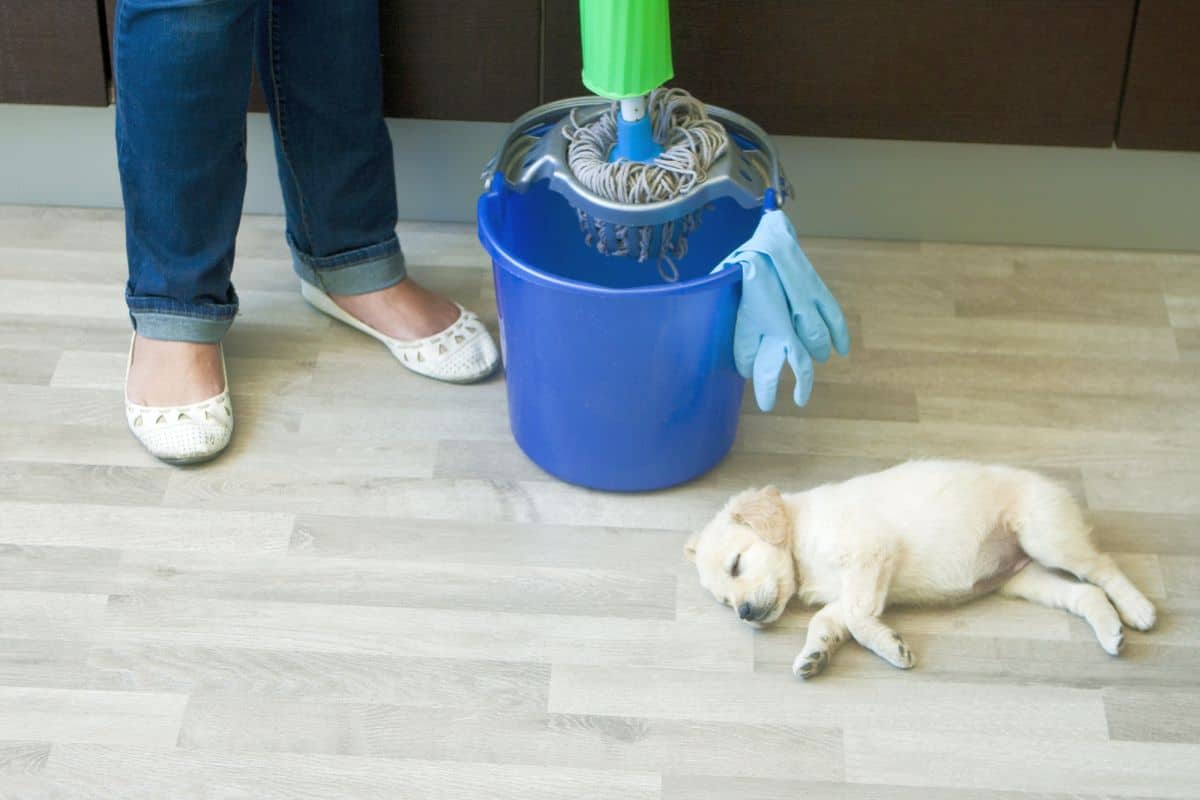
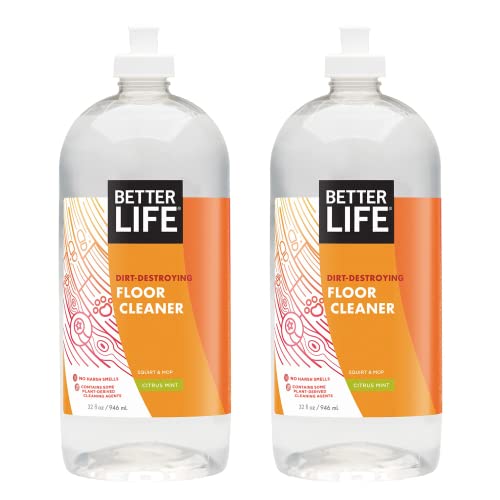





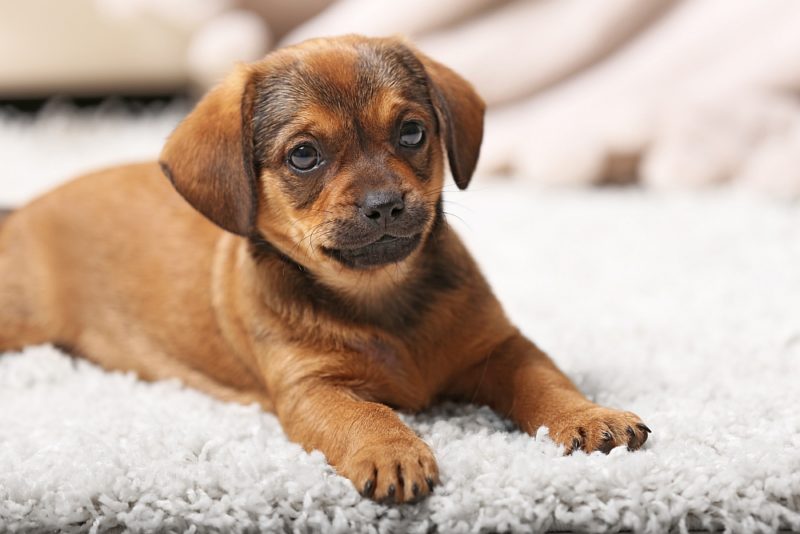
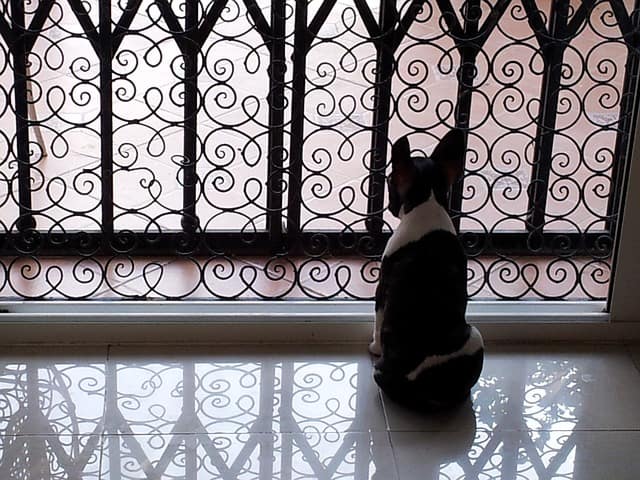


Leave a Comment